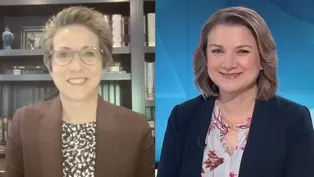
Rapid AI advancements spark wonder and concern
Clip: 5/20/2024 | 7m 10sVideo has Closed Captions
Tech companies unveil rapid AI advancements, sparking wonder and concern
Rapid advancements in artificial intelligence continue as companies roll out new products sparking wonder and concern. OpenAI unveiled its next-generation chatbot, GPT-4o, which can respond to voice, text and visual commands in real-time. Google also unveiled a new AI-powered search function. Amna Nawaz discussed these developments with Nilay Patel of The Verge and the Decoder podcast.
Problems with Closed Captions? Closed Captioning Feedback
Problems with Closed Captions? Closed Captioning Feedback
Major corporate funding for the PBS News Hour is provided by BDO, BNSF, Consumer Cellular, American Cruise Lines, and Raymond James. Funding for the PBS NewsHour Weekend is provided by...

Rapid AI advancements spark wonder and concern
Clip: 5/20/2024 | 7m 10sVideo has Closed Captions
Rapid advancements in artificial intelligence continue as companies roll out new products sparking wonder and concern. OpenAI unveiled its next-generation chatbot, GPT-4o, which can respond to voice, text and visual commands in real-time. Google also unveiled a new AI-powered search function. Amna Nawaz discussed these developments with Nilay Patel of The Verge and the Decoder podcast.
Problems with Closed Captions? Closed Captioning Feedback
How to Watch PBS News Hour
PBS News Hour is available to stream on pbs.org and the free PBS App, available on iPhone, Apple TV, Android TV, Android smartphones, Amazon Fire TV, Amazon Fire Tablet, Roku, Samsung Smart TV, and Vizio.
Providing Support for PBS.org
Learn Moreabout PBS online sponsorshipAMNA NAWAZ: Rapid advancements in artificial intelligence continue as companies roll out new products sparking both wonder and concern.
Over the past week, OpenAI unveiled its next generation chatbot, or ChatGPT-4o.
The new A.I.
assistant can respond to voice, text and visual commands in real time, as in this presentation when engineers asked it to tell a bedtime story.
A.I.
VOICE: Oh, a bedtime story about robots and love?
I got you covered.
Gather round, Barret.
Once upon a time... MAN: I really want maximal emotion, like maximal expressiveness, much more than you were doing before.
A.I.
VOICE: Understood.
Let's amplify the drama.
Once upon a time... WOMAN: Can you do this in a robotic voice now?
A.I.
VOICE: Initiating dramatic robotic voice.
(LAUGHTER) (APPLAUSE) A.I.
VOICE: Once upon a time.
AMNA NAWAZ: OpenAI actually paused the use of that particular virtual voice after some pointed out its similarity to the robot voiced by Scarlett Johansson in the movie "Her."
SCARLETT JOHANSSON, Actress: Good morning, Theodore.
JOAQUIN PHOENIX, Actor: Good morning.
SCARLETT JOHANSSON: You have a meeting in five minutes.
You wanted to try getting out of bed?
JOAQUIN PHOENIX: You're too funny.
SCARLETT JOHANSSON: OK, good.
I'm funny.
I want to learn everything about everything.
AMNA NAWAZ: Google also unveiled a new A.I.-powered search function this week.
For more on that and all these developments, were joined by Nilay Patel, editor in chief of The Verge and host of the "Decoder" podcast.
So, Nilay, let's just start with Google, the most visited Web site in the world.
It's making major changes to how billions of people search the Web.
Users will now see an A.I.-generated answer for their search.
How big a deal is that?
NILAY PATEL, Editor in Chief, The Verge: It's a momentous change for how the Web works today.
A lot of Web sites that you visit are driven by the need for Google traffic.
It's up to 30 percent or more of most big Web sites' traffic comes from Google.
So when Google starts keeping more of that traffic for itself, that's going to change the economics of putting content on the Web.
It might shift some of that content to platforms like TikTok and YouTube and Instagram.
And it will certainly shake up how the Web is organized and structured, because, instead of getting links from Google, publishers might try to gain their way into those A.I.
previews.
And I think Google has a big question to answer around what the incentive to put new content on the web is, if it's just going to synthesize that content and present it to people searching for free.
I talked to Google CEO Sundar Pichai about this.
He said it's a paradigm shift.
There's going to be changes that he believes the Web will endure.
AMNA NAWAZ: You described the reaction to the news of this new search from people who actually make Web sites as fundamentally apocalyptic.
Why?
NILAY PATEL: Yes, I mean, the Web has reached a steady state over the past 25, 30 years, where people put up Web sites, Google indexes those Web sites.
We allow Google to do that because that's what's considered fair use.
And then, in return, Google sends traffic to Web sites.
And it's a huge portion of traffic for a lot of the Web sites on the Internet is Google search traffic.
If Google starts to keep that traffic for themselves, then a lot of businesses will fail.
AMNA NAWAZ: OK, what about this new chatbot that ChatGPT -- that OpenAI just revealed?
We saw a brief demo of that.
Is this basically the model for how all of us are going to be interacting with our tech one day?
NILAY PATEL: It's the vision.
Google unveiled something that's very similar to called Project Astra, this idea that you have a multimodal search interface, where you have got your phone in your hand, your phone is looking at things with its camera.
It's talking to you about what it sees.
You can ask it questions.
It has a personality.
OpenAI is really leaning into the personality factor here.
What we haven't seen is a huge leap in terms of accuracy.
So, because the chatbots are very good at language, that you can build these products that are very convincing, right?
They can talk to you that have these personalities, they can emote in different ways, they can do different kinds of image generation.
They can recognize videos of broken toys in your home and tell you how to fix them.
The flip side of it is language and intelligence aren't 100 percent correlated, maybe not at all correlated.
And so you're seeing this gap of the demos where you ask it questions and it's very confident in what it tells you.
But, sometimes, it's wrong.
And I think that's actually the thing that's going to hold these kinds of products back from widespread adoption is they have got to get better at being accurate.
I think we're seeing incredible advances in facility with language and we're seeing a pretty steady state in terms of actual intelligence.
AMNA NAWAZ: Meanwhile, Microsoft, we should mention, is also going to make its own big A.I.
announcement this week.
What do we expect to hear from them?
NILAY PATEL: So, today, Microsoft unveiled a new line of A.I.
P.C.s, Copilot P.C.s That's what they're branding them as.
They have got a new chip in them which they claim will be faster than the chip in Apple's MacBook Air that has been a benchmark for the industry for a very long time.
And they're rolling out a new version of Windows.
And it has a bunch of A.I.
features built into it for consumers, including one called Recall, which is fascinating, where the operating system or Windows basically watches along with you.
As you use your computer, you can ask it questions.
As you're playing games, it can talk to you about what it's seeing on the screen in the game.
You can ask it questions for help in the games.
As you're using the applications on your P.C., you can ask it for help, it can drive your P.C.
for you.
This is a big vision for in -- computing.
It's been the dream for a long time.
You will have an intelligent agent on your computer that is actually helping you use that computer.
Microsoft took the first steps of that today with the Copilot P.C.s.
It seems very compelling.
I have a lot of questions about privacy and security, and where all that data is going, and who's tracking, and who has access to it.
Microsoft says it's all being done locally on the P.C., but I really want to test this stuff out and make sure that that's actually true.
AMNA NAWAZ: You mentioned privacy, security concerns, also accuracy concerns with some of the other A.I.
functions.
I guess the question is, how much insight do you have as someone who covers this into where all of those concerns rank, in terms of how quickly some of these tech firms are pushing out new products?
Is that a shared concern?
NILAY PATEL: I don't think that concern ranks nearly highly enough.
I think what you're seeing here is an extraordinary battle -- extraordinary battle between a bunch of big tech companies who feel the competitive pressure for the first time in a long time from OpenAI, from one another, and they're racing these products out to capture market share, so they don't get left behind.
In just a few weeks, Apple's going to roll out a bunch of A.I.
features in the new version of iOS for the iPhone, and we will see them partner with a Google or an OpenAI for some of the features in a way that might cut against some of their privacy promises.
We have to see what they claim, and that that is all because of the pressure that this is a paradigm shift on the order of mobile, on the order of social networking.
And if you get left behind, you're going to lose a ton of market share.
AMNA NAWAZ: That is Nilay Patel, editor in chief of The Verge and host of the "Decoder" podcast.
Thank you so much for being with us.
NILAY PATEL: Thanks for having me.
Can the ICC arrest Israeli, Hamas leaders? Experts weigh in
Video has Closed Captions
Clip: 5/20/2024 | 6m 49s | Can the ICC arrest Israeli and Hamas leaders for war crimes? Legal experts weigh in (6m 49s)
Deaths leave Iran without key leadership at crucial moment
Video has Closed Captions
Clip: 5/20/2024 | 9m 15s | Raisi's death leaves Iran without key leadership at crucial moment for Middle East (9m 15s)
How Trump’s legal team is trying to ruin Cohen's credibility
Video has Closed Captions
Clip: 5/20/2024 | 4m 55s | How Trump’s legal team is trying to ruin Michael Cohen's credibility in hush money trial (4m 55s)
ICC seeks war crimes charges for Israeli and Hamas leaders
Video has Closed Captions
Clip: 5/20/2024 | 2m 58s | International Criminal Court seeks war crimes charges for Israeli and Hamas leaders (2m 58s)
Lorraine O'Grady on her long path into art world acceptance
Video has Closed Captions
Clip: 5/20/2024 | 6m 37s | Acclaimed artist Lorraine O'Grady on her long path into art world acceptance (6m 37s)
Tamara Keith and Amy Walter on GOP leaders at Trump's trial
Video has Closed Captions
Clip: 5/20/2024 | 8m 52s | Tamara Keith and Amy Walter on Republicans rallying around Trump at his trial (8m 52s)
Providing Support for PBS.org
Learn Moreabout PBS online sponsorshipSupport for PBS provided by:
Major corporate funding for the PBS News Hour is provided by BDO, BNSF, Consumer Cellular, American Cruise Lines, and Raymond James. Funding for the PBS NewsHour Weekend is provided by...

















